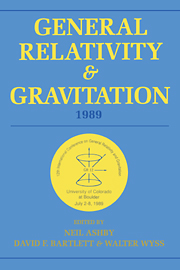 General Relativity and Gravitation, 1989
General Relativity and Gravitation, 1989 Published online by Cambridge University Press: 05 March 2012
Introduction
The workshop consisted of an introductory overview and of seven specialized talks. The talks were selected among twenty-five submitted abstracts and were presented in an order consistent with the three subsequently discussed categories, i.e. from rigourous mathematical results about approximation methods, to definition of approximation methods, to physical results obtained by approximation methods. This order was chosen to emphasize the following easily forgotten fact. Ideally, physics should connect the mathematical axioms defining our theories to the results of observations or experiments by means of a tight chain of deductions. However, in practice, this chain of deductions often contains gaps, and one of the main sources of gaps lies in the use of mathematically ill justified approximation methods as substitutes for the exact theories. In order to bridge the latter gap one needs, on the one hand, some clear algorithmic definition of the approximation methods used together with a formal study of the structure of its successive terms, and, on the other hand, mathematical theorems proving that the formal sequence defined by the ‘approximation method’ is either convergent, or asymptotic, to some exact solution. Progress on both aspects has recently been obtained, and has been reported, or quoted, during the workshop.
Talks presented at the workshop fell into three categories. Talks on mathematical results about approximation methods showed instances where the conceptually important gap between mathematics and the use of approximation methods by physicists can be closed, or narrowed.
To save this book to your Kindle, first ensure no-reply@cambridge.org is added to your Approved Personal Document E-mail List under your Personal Document Settings on the Manage Your Content and Devices page of your Amazon account. Then enter the ‘name’ part of your Kindle email address below. Find out more about saving to your Kindle.
Note you can select to save to either the @free.kindle.com or @kindle.com variations. ‘@free.kindle.com’ emails are free but can only be saved to your device when it is connected to wi-fi. ‘@kindle.com’ emails can be delivered even when you are not connected to wi-fi, but note that service fees apply.
Find out more about the Kindle Personal Document Service.
To save content items to your account, please confirm that you agree to abide by our usage policies. If this is the first time you use this feature, you will be asked to authorise Cambridge Core to connect with your account. Find out more about saving content to Dropbox.
To save content items to your account, please confirm that you agree to abide by our usage policies. If this is the first time you use this feature, you will be asked to authorise Cambridge Core to connect with your account. Find out more about saving content to Google Drive.